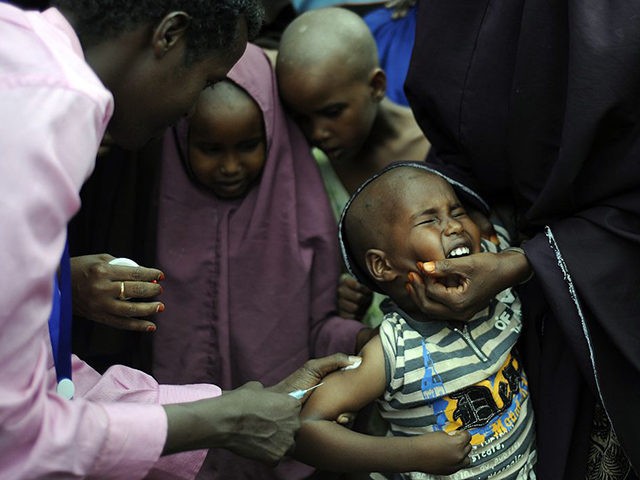Dr. Robin Nandy, chief of immunization at the United Nations International Children’s Emergency Fund (UNICEF), said Wednesday that wealthy nations should donate coronavirus vaccines to poor countries before they have finished vaccinating their own populations.
“This is a moment for global solidarity and not vaccine nationalism,” Nandy told Sky News.
“We cannot forget the low and middle-income countries,” he explained. “Many wealthy countries have made commitments of doses to vaccinate three, four times over the size of their populations. Attempting to vaccinate your entire population before ensuring equity will still leave countries at risk.”
Nandy said UNICEF is “frustrated that the UK, U.S., EU are vaccinating and places like sub-Saharan Africa do not have access.”
“That’s something we want to deal with and with our COVAX partners we’re putting in mechanisms in which we can get those vaccines and distribute them to countries who can’t afford them or do not have the means to negotiate for them,” he said.
COVAX is the World Health Organization’s (W.H.O.) initiative to provide “global equitable access to Covid-19 [Chinese coronavirus] vaccines.” Among the stated goals of the initiative is providing doses of vaccine for at least 20 percent of the population of every country, a threshold that should cover health care workers and the most high-risk segments of the population, including the elderly.
Nandy conceded the speed of the coronavirus vaccine rollout is “unprecedented,” since it would normally have taken years to vaccinate even high-income countries.
“Having a vaccine is not enough, vaccines don’t deliver themselves, it needs human and financial resources and I don’t see that adequate resources are now available,” he said of the situation in developing countries.
“We’re used to distributing vaccines in these countries but there are difficulties, you need community engagement and need to tackle misinformation. The Covid-19 vaccine is the first to be associated with misinformation before it is even available — this is unchartered [sic] territory,” he lamented, noting that some of that uncharted territory lies within dangerous conflict zones where delivering minimal supplies of food can be difficult, let alone delicate and expensive vaccines.
Nandy pointed out UNICEF was already struggling to deliver other vaccines in poor and conflict-ridden countries, but those efforts were largely suspended as the coronavirus pandemic spread, and must now be restarted along with Chinese coronavirus vaccinations.
Advocates of “vaccine equity” argue that, in addition to the moral argument for vaccine charity to poor nations, it is in the best interests of wealthy nations to cover the cost of global vaccinations to prevent new mutations of the coronavirus from emerging and re-infecting the developed world. Also, global commerce cannot fully resume until the pandemic is controlled everywhere supply lines run.
At the end of 2020, “vaccine equity” advocates estimated 67 low-income countries had made no provision for purchasing vaccines of their own and were entirely dependent on international charity operations like COVAX. These advocates accused wealthy nations like the United States, United Kingdom, and Canada of “hoarding” vaccines, frequently citing the same three- or four-times population estimates of their stockpiles as Nandy.
A study the International Chamber of Commerce commissioned in January envisioned an “extreme scenario” where the global economy would lose over $9 trillion in value — more than the Gross Domestic Products of Japan and Germany combined — if wealthy countries did not distribute enough coronavirus vaccine to poor nations.
Much of this damage was projected to come from pandemic-related economic collapse in the Third World, wiping out important markets and suppliers for First World products and industries. Key industries that rely on global supply chains, including automotive, textiles, and construction, could lose up to five percent of their value if developing nations are not fully vaccinated until 2024, as the extreme scenario anticipated. Supplies of everything from Zambian copper to Nigerian oil would be interrupted while soaring debt burdens in poor countries would threaten defaults that could jeopardize the world financial system.
“No economy, however big, will be immune to the effects of the virus until the pandemic is brought to an end everywhere. Purchasing vaccines for the developing world isn’t an act of generosity by the world’s richest nations. It’s an essential investment for governments to make if they want to revive their domestic economies,” International Chamber of Commerce Secretary-General John Denton said in January, hitting the same notes Dr. Nandy of UNICEF would hit in his February 17 interview.
The Brookings Institution argued last week that these extreme scenarios are overblown, although their basic concerns are valid enough. Among other things, Brookings pointed out death rates from Chinese coronavirus tend to be much lower in developing nations, for reasons not yet fully understood but possibly related to their greater experience with handling major disease outbreaks. This would mitigate the economic damage from the pandemic, a conclusion borne out by global trade levels that have not dipped to the alarming levels projected in early 2020.
The Brookings analysis suggested that, besides the moral imperative to alleviate human suffering as quickly as possible, the strongest practical argument for “vaccine equity” is the danger of new mutations emerging from untreated Third World populations and restarting the devastating cycle of quarantines and lockdowns all around the world.
The Washington Post on Tuesday brought up another reason: the danger of China or Russia spreading their influence across the Third World by fulfilling the demand for coronavirus vaccines. Beijing has placed considerable emphasis on “vaccine diplomacy,” and could use it to score a “double win” in regions like Latin America by both expanding its pharmaceutical market and accumulating political leverage. Peru, for example, has already bet heavily on China to supply its vaccine needs.

COMMENTS
Please let us know if you're having issues with commenting.